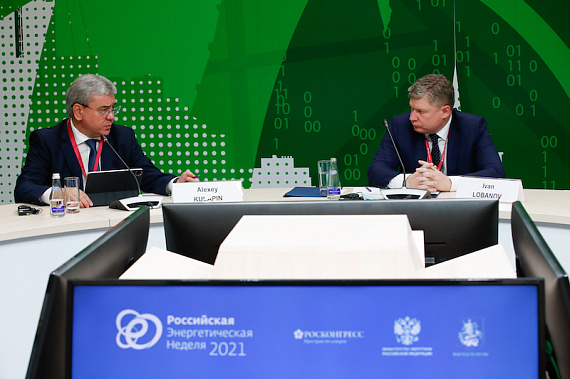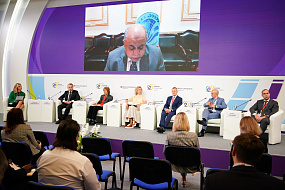Science and the Fuel and Energy Sector Underpinned by Knowledge Development

OUTCOMES
Cooperation between science and the fuel and energy sector facilitates competitive new projects
“Work on high-tech development via contracts between the Government of the Russian Federation and major companies with state involvement began in 2019 on the instruction of the Russian President. One example is an agreement between the Government of the Russian Federation and Rosseti, which outlines the development of advanced electric power transmission and a distributed smart grid system. In this case, Rosseti is acting not only as a major power grid operator, but also as a driver of technological development bringing scientific institutes on board,” General Director of the Russian Energy Agency (REA) of the Ministry of Energy of the Russian Federation Alexey Kulapin.
“We are successfully exporting the product of our design engineering to over 14 countries. It is being produced by our people and our colleagues right now and being sold digitally. All of this is the result of knowledge interaction with our key universities,” Deputy General Director Project Engineering and International Cooperation at RusHydro Sergey Machekhin.
“The energy sector could commission applied research into quantum technologies and thereby make a strategic contribution to the future development of these areas,” Chief Strategy Officer at QAPP and Junior Principal Investigator of the Quantum Information Technologies Group of the Russian Quantum Center Alexey Fedorov.
The Russian Energy Agency should aim to strengthen cooperation between science and the fuel and energy sector
“As a subdivision of the Ministry of Energy of the Russian Federation, the Russian Energy Agency serves simultaneously as a think tank, a scientific organization and a federal scientific and technological information centre. Further to this, we are helping to coordinate scientific and technological development across the fuel and energy sector,” General Director of the Russian Energy Agency (REA) of the Ministry of Energy of the Russian Federation Alexey Kulapin.
“What is the role of the Russian Energy Agency in the creation of a platform where Russian and international universities can exchange their opinions and experience in green areas? As well as taking on a coordinating function, I see it as an integrator, providing a unique bridge between fuel and energy companies,” Chairman of the Energy Committee and Chairman of the Steering Committee of the Green Initiative Project of the Association of European Businesses (АЕВ) Ernesto Ferlenghi.
PROBLEMS
There aren’t enough highly qualified professionals in Russia to drive developments in the energy sector
“We recognize that realizing the country’s potential in the technology race and retaining its status on the global stage is the direct outcome of the professionalism and competencies of the specialists working in the industry. The rapid technological development being seen today and the need for further scientific and technological development generate demand for new competencies and approaches to training high-tech professionals. One of the most important tasks at the present moment is training innovative technology and science specialists for the economy and energy of the future,” General Director of the Russian Energy Agency (REA) of the Ministry of Energy of the Russian Federation Alexey Kulapin.
“I would like to focus on the processes involved in training staff. There must be a forecast for technological development, an understanding of what is going to be produced in which region, and an awareness of what the competencies of those doing the training are. We will then be able to train staff with an outlook covering a period of 5–7 years,” Scientific Director of the Keldysh Institute of Applied Mathematics of the Russian Academy of Sciences Boris Chetverushkin.
“The first thing to say is that when you speak to people about this topic, they either understand it or they don’t. Once again we are talking about staff. What matters is the ability of a particular professional or manager to make decisions based on a set of general provisions rather than intuition,” Director of Green Capital Alliance and Professor at the Russian Presidential Academy of National Economy and Public Administration (RANEPA) Maxim Safonov.
SOLUTIONS
The scientific and technological development of the sector should be achieved through private investment
“We understand perfectly well that developing and rolling out groundbreaking new technologies requires significant investment. As a number of experts have noted, the greener the future we want to build, the greater the costs we will incur in building it. According to the International Energy Agency, global investments in green energy must increase by more than threefold to around USD 4 trillion by 2030 in order to decarbonize the economy. It is therefore extremely important that we bring in market mechanisms for non-budgetary financing in addition to the budget funds allocated for scientific and technological development,” General Director of the Russian Energy Agency (REA) of the Ministry of Energy of the Russian Federation Alexey Kulapin.
“Any well-targeted contribution to science will deliver results sooner or later. We need to offer support to our scientists of course, and make way for the next generation. It is crucial that we do this now. I will nevertheless support my colleagues, as I believe that the development of the natural and applied sciences is not only, and in fact not chiefly the state’s role today. If developments aren’t applied in the real economy most of the people involved, people who love science, will remain simply that. It is important that we, the business community, understand this. We are open to collaboration,” Deputy General Director Project Engineering and International Cooperation at RusHydro Sergey Machekhin.
For more information, visit the Roscongress Foundation’s Information and Analytical System at roscongress.org.




